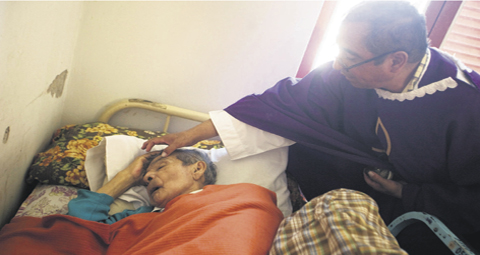March 27 | ![]() 0 COMMENTS
0 COMMENTS ![]() print
print

Why euthanasia is partially blind to love
Fr Ronald Rolheiser
Raissa Maritain, the philosopher and spiritual writer, died some months after suffering a stroke. During those months she lay in a hospital bed, unable to speak. After her death, her husband, the renowned philosopher, Jacques
Maritain, in preparing her journals for publication, wrote these words: “At a moment when everything collapsed for both of us, and which as followed by four agonising months, Raissa was walled in herself by a sudden attack of aphasia. Whatever progress she made during several weeks by sheer force of intelligence and will, all deep communication remained cut off. And subsequently, after a relapse, she could barely articulate words. In the supreme battle in which she was engaged, no one on earth could help her, myself no more than anyone else. She preserved the peace of her soul, her full lucidity, her humour, her concern for her friends, the fear of being a trouble to others, and her marvellous smile and the extraordinary light of her wonderful eyes. To everyone who came near her, she invariably gave—and with what astonishing silent generosity during her last two days, when she could only breathe out her love—some sort of impalpable gift which emanated from the mystery in which she was enclosed.”
The emphasis on the last sentence is my own and I highlight it because, I believe, it has something important to say in an age where, more and more, we are coming to believe that euthanasia and forms of physician-assisted suicide are the humane and compassionate answer to terminal illness.
The case for euthanasia generally revolves around these premises:
Suffering devalues human life and euthanasia alleviates that suffering and the ravages of the body and mind that come with that suffering so as to provide a terminally ill person ‘death with dignity’ and death with less suffering. As well, it is argued, that once an illness has so debilitated a
person so as to leave him or her in a virtual vegetative state, what is the logic for keeping such a person alive? Once dignity and usefulness are gone, why continue to live?
What’s to be said in response to this? The logic for euthanasia, compassionate in so far as it goes, doesn’t go far enough to consider a number of deeper issues. Dignity and usefulness are huge terms with more dimensions than first meet the eye. In a recent article in AMERICA magazine, Jessica Keating highlights some of those deeper issues as she argues against the logic of those who have lauded Brittany Maynard’s—the young woman who captured national attention last year by choosing assisted suicide in the face of a terminal illness—decision to take her own life as ‘courageous,’ ‘sensible,’ and ‘admirable.’ Keating concedes that, had she not made that decision, Maynard would no doubt have suffered greatly and would in all likelihood eventually been rendered unproductive and unattractive. But, Keating argues: “She would have been present in a web of relationships. Even if she had fallen unconscious, she likely would have been read to, washed, dressed and kissed. She would have been gently caressed, held and wept over. She would simply have been loved to the end.”
That’s half the argument against euthanasia. The other half reads this way: Not only would she have been loved to the end, but, perhaps more importantly, she would have been actively emitting love until the end. From her ravaged, silent, mostly-unconscious body would have emanated an intangible, but particularly powerful, nurture and love, akin to the powerful life-giving grace that emanated from Jesus broken, naked body on the cross.
We too seldom make this important distinction: We believe that Jesus saved us through His life and through His death, as if these were the same thing. But they are very different: Jesus gave His life for us through his activity, his usefulness, through what He could actively do for us. But He gave His death for us through His passivity, through His helplessness, through the humiliation of His body in death. Jesus gave us His greatest gift precisely during those hours when He couldn’t do anything active for us.
And this isn’t something simply metaphorical and intangible. Anyone of us who have sat at the bedside of a dying loved one have experienced that in that person’s helplessness and pain he or she is giving us something that he or she couldn’t give us during his or her active life. From that person’s helplessness (above) and pain emanates a power to draw us together as family, a power to intuit and understand deeper things, a deeper appreciation of life, and especially a much deeper recognition of that person’s life and spirit. And this, impalpable gift, as Maritain says, emanates from the
mystery of pain, non-utility, and dying in which he or she is enclosed.
In our dying bodies we can give our loved ones something we cannot fully give them when we are healthy and active. Euthanasia is partially blind to the mystery of how love is given.
—Fr Ronald Rolheiser is a Catholic priest and member of the Missionary Oblates of Mary Immaculate. He is president of the Oblate School of Theology in San Antonio, Texas. Visit his website at www.ronrolheiser.com











